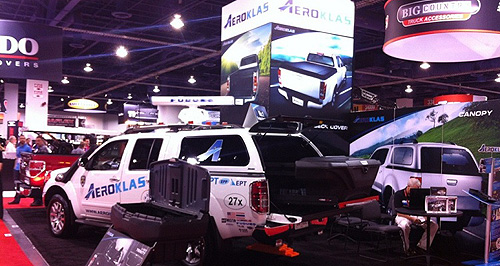Make / Model Search
News - General News - PartsThai company Aeroklas looks to Australian productionCover-all: As well as producing parts such as the Ford Falcon ute’s bed-liner in Thailand, Aeroklas makes canopies for vehicles including the Nissan Navara. Parts-maker Aeroklas could soon produce components in Australia for export8 Mar 2013 By IAN PORTER THE Thai company that provides bed-liners for the locally made Ford Falcon ute has spoken of plans to develop products here in Australia, with an eye to exports. Thai Auto parts company Aeroklas has made an impression in the local parts industry since it set up here in 2010, supplying ute tray liners, tonneaux and canopies to Ford and the aftermarket. But, while it looks like just another example of an offshore supplier taking advantage of the high Australian dollar to grab a piece of the local market, that’s not the whole story. Aeroklas has, in fact, opened a new sales window for the locally based automotive electrical, electronic, plastics and systems supplier Lumen Australia. And the Thai-based company intends to become an exporter from Australia, as well. “Aeroklas makes the bed liner for the Falcon ute and also for imported vehicles like the Toyota HiLux, Ford Ranger and Mazda BT50,” said Aeroklas original equipment manager Rod Braszell. “And we also make a plastic undershield for the EcoBoost Falcons, to improve aerodynamics and fuel efficiency.” Among the various products distributed here are canopies for the Ford Ranger and Mazda BT50, and both of those are fitted with electric harnesses made by Victoria-based Lumen. The harnesses for the Aeroklas canopies are, in fact, made in Lumen’s Taiwan plant and sent to Thailand for installation, but all the design and development work was done by Lumen’s 30-strong engineering team at its Hallam plant south-east of Melbourne. The bed liners and all the other parts are made in Thailand. “We are going to develop other products here locally so that we can be an exporter, too, and then we’ll be both an exporter and an importer,” Mr Braszell said. He said Aeroklas was not deterred by the high Australian dollar. This resilience may reflect the fact that Aeroklas products are mainly accessories and not mass-produced original equipment, where cost is everything. “Whether the dollar is at $US1.04 like today or what it used to be at US85c, we feel there is still a market for the products. “Once you put it in the distribution channel, it is about setting the price, anyway. So the price is set at whatever it is. It has to absorb whatever the currency move is. “If people want an Aeroklas product, they will pay the extra price. Or it is already pitched at a competitive price.” Mr Braszell said Aeroklas was working with Ford on an additional product that would use Australian-sourced components. “We have another product for Ford which we are going to provide from a local source, but they’ve already indicated that the price we have provided is very competitive. “It’s not all that the dollar is so high and we can’t do business outside of Australia. I think it’s more about what the market can bear. “It’s a pretty exciting thing to happen,” he said. Mr Braszell conceded that these were tough times for the local parts industry, which is servicing a car assembly sector operating at 60-year lows. But he said Aeroklas directors were optimistic. “I hear all the bad stories about the industry, but this is what we think we are going to do, so we may as well give it a go. I do hear all those stories about manufacturing coming to an end. “We have to try and do something.” Lumen Australia national sales manager Bruce Hamilton said that the two companies were planning further co-operation locally and offshore. “We can see how we can do things globally together as partners. Lumen is rolling out globally at the moment with all our other product range and regional offices.” Apart from wiring harnesses, Lumen makes a range of custom plastic and electronic parts including control modules, LED lamp assemblies and various rear camera, Bluetooth hands-free and parking sensor systems that are sold as genuine parts under the carmakers’ brands. Lumen’s strategy is similar to that employed by Aeroklas, which started in the aftermarket and wins a proportion of its work direct from the carmakers.  Read more |
Click to shareGeneral News articlesResearch General News Motor industry news |












Facebook Twitter Instagram